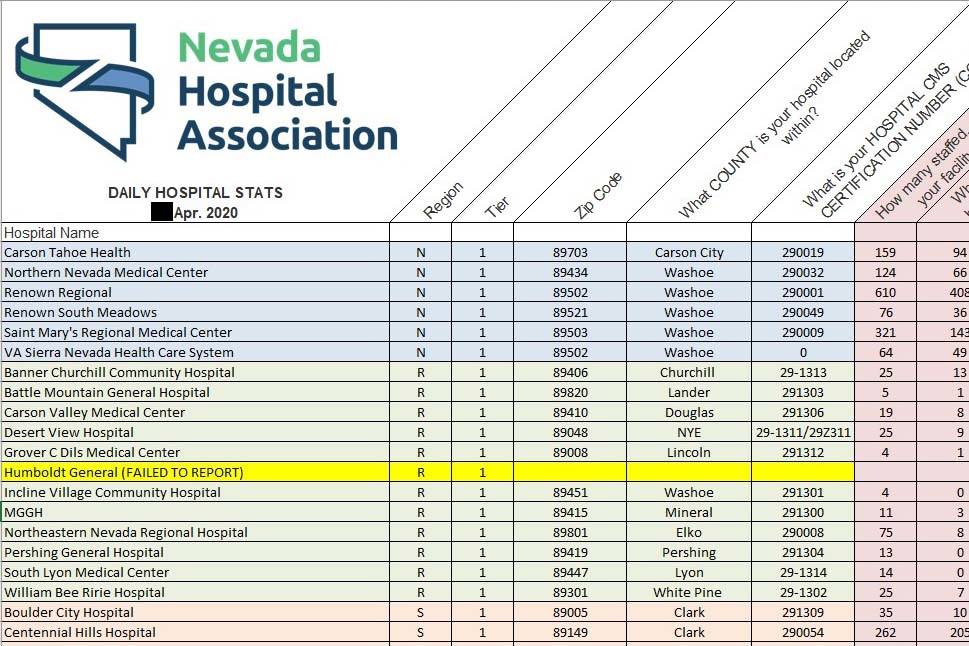Nevada hospital reports kept secret amid coronavirus spread
The Nevada Hospital Association has reportedly threatened to stop providing state health officials with daily reports detailing acute-care hospitals’ coronavirus activity, if those officials share the information with the public.
For almost four weeks, the Review-Journal has sought copies of the documents from state and local governments under Nevada’s Public Records Act in order to provide the information to the public. The NHA has refused to provide the reports, which are provided to Gov. Steve Sisolak and other top state officials as they make critical decisions during the COVID-19 outbreak by monitoring hospitals’ essential equipment usage, bed occupancy and staffing levels.
Insight into why the reports have not been produced was revealed on Friday in an email from Washoe County Health District spokesman Scott Oxarart.
“Because the NHA considers the documents to be confidential they have notified recipients that they will no longer provide these reports to any recipient who discloses the report,” Oxarart wrote in the email, which was written with the support of the Washoe County district attorney’s office. “The inability to receive or use these reports will result in the Washoe County Health District no longer providing critical information to Washoe County residents about hospital capacity, which is one of the most pertinent statistics that we provide in our daily Joint Information Center updates to the media and public.”
The daily spreadsheet, compiled by the hospital association and provided to government agencies, provides a hospital-by-hospital breakdown that includes the facilities’ occupancy rates, number of coronavirus patients and deaths, and inventories of N95 masks to protect front-line health care workers.
The report also tracks how well 38 acute-care hospitals across the state are staffed and how many of their doctors and intensive care nurses are out sick, according to one day’s report obtained by the Review-Journal from a confidential source. It contained no identifying information about patients or hospital staff.
Losing access to the information would hamper the health district’s ability to inform county residents and “possibly sever public trust,” Oxarart wrote.
Health district officials would need to continue discussions with the NHA before determining whether to produce the records, according to Oxarart. If the NHA did not agree to release the records, the health district “may object to production,” he wrote.
“We may be able to assist you in obtaining the information you need in a way that will not violate confidentiality, but will need to know how you plan to use the information,” Oxarart wrote.
In contrast to Oxarart’s claim, NHA spokeswoman Amy Shogren said Friday that the association had not advised or asked government agencies to withhold the hospital reports. Shogren did not immediately respond to a request to clarify the discrepancy.
Such an ultimatum to governments would fly in the face of the state’s public record laws, Nevada Open Government Coalition president Patrick File said.
While the hospital association is a private nonprofit that is not bound to respond to record requests, File said the daily reports became subject to the state’s public records act as soon as the government received copies.
“You have a private entity that’s not elected or granted authority by elected officials driving open-government decision making,” he said. “It’s surprising to me that a state government entity would cede that authority to a private entity.”
Nevada Press Association executive director Richard Karpel agreed with File’s assessment. He said the reports could be used to inform the public in a number of ways, including to disprove conspiracy theories that have equated near-empty hospital parking lots with proof the coronavirus is a hoax.
“That’s the kind of conspiratorial thinking that happens when people don’t have information,” he said. “I think people want to know what’s going on at the hospital near them.”
No personal information
Instead of making its full daily reports public, the NHA has released summary statistics showing daily occupancy rates and ventilator usage rates for Southern, Northern and rural Nevada.
The nonprofit trade group also publishes a summary graphic on its website charting the total number of confirmed and suspected COVID-19 patients hospitalized across Nevada by day.
Shogren wrote in an email to a Review-Journal reporter on April 23 that releasing the full daily reports “could adversely affect the public’s perception of where these cases are being treated.”
“There are several other reasons NOT to provide hospital-specific data including that the media likes to sensationalize information — that is unfortunate,” she continued. “Outside of this pandemic, it is our Association’s policy to never provide hospital-specific data.”
Shogren wrote in her email that her comments were “off the record,” but the reporter did not agree to go off record.
In a followup email sent Friday, Shogren said that the trade group’s information had “been taken out of context on previous occasions.” She said the NHA plans to “repackage hospital data beginning next week in a format that can be shared by all recipients and understood by the public.”
Records act violation
The Review-Journal first requested the daily reports from state officials on April 6.
The state did not acknowledge the request within five business days — a violation of the Nevada Public Records Act. When a reporter notified the state that it was in violation of the law, a legal analyst in Sisolak’s office replied that it would take “eight to ten weeks” for the office to compile and release the records.
No reason was provided for why it would take at least two months to release the records.
Sisolak on Thursday sounded surprised to hear the public record request would take so long to fulfill. He said Nevada agencies had been “inundated” with record requests about the coronavirus outbreak, and staff members were working to disseminate records as quickly as possible.
“I don’t know who told you it will take two months to produce the report,” he said. “We will get them to you in as timely a manner as possible, and I will ask about your request if someone told you eight weeks.”
The Review-Journal requested the records from the Southern Nevada Health District on April 17. Health district attorney Heather Anderson-Fintak said she could not immediately produce the records because they “were not created by the Southern Nevada Health District, but provided to us pursuant to the current public health emergency.”
In a followup email on Friday, she wrote that her agency plans to release the records by May 15. The health district came to the decision after state officials did not object to the release of the documents.
“However, the Nevada Hospital Association does have within its ability to file an injunction in court regarding the proposed release,” she wrote.
Contact Michael Scott Davidson at sdavidson@reviewjournal.com or 702-477-3861. Davidson is a member of the Review-Journal’s investigative team, focusing on reporting that holds leaders and agencies accountable and exposes wrongdoing. Follow @davidsonlvrj on Twitter.













































